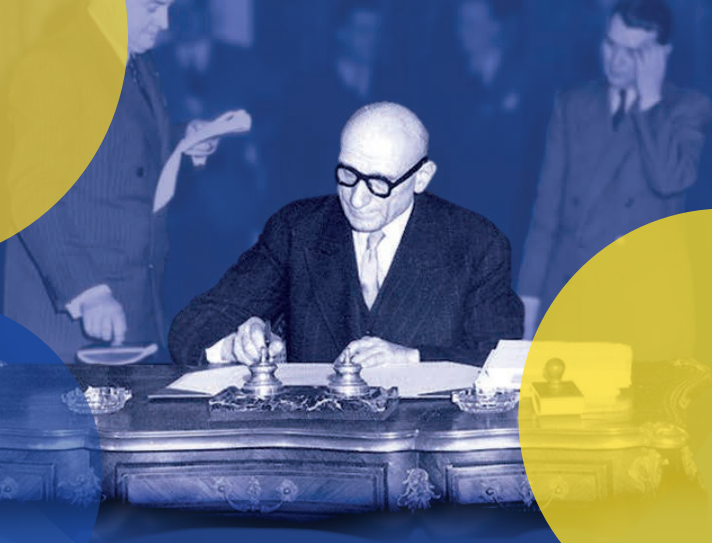L’héritage de Robert Schuman dans la vision et dans l’action de Jacques Delors
Ce texte est extrait d’une publication collective en anglais, « Beyond Robert Schuman’s Europe – citizen’s ideas and historic perspective for a better Union », fruit d’un projet financé par le programme Europe for Citizens et mené par la Fondation Geremek.

La construction européenne est décrite selon deux narratifs complémentaires : celui des crises et celui des « petits pas ». « L’Europe se fera dans les crises », a-t-on coutume de citer de Jean Monnet, plus encore en cette période bouleversée par des crises en série que les États de l’Union européenne et ses institutions n’ont eu de cesse d’affronter : zone euro, réfugiés, Brexit et aujourd’hui Covid. Le narratif des « petits pas », théorisé par le même Jean Monnet, s’applique en temps ordinaire s’il en est. Il décrit la trajectoire d’une Europe qui, d’un traité à l’autre, d’approfondissements en élargissements, se forme par touches successives. Ces deux dynamiques, celle chaotique des crises comme celle ordonnée des petits pas, pêchent par excès de confiance dans leur propre force d’inertie. Comme si plus rien ne pouvait arrêter le projet européen depuis son lancement du 9 mai 1950. Sa poursuite n’obéirait qu’aux soubresauts des événements ou, au contraire, au rythme d’une marche invariablement tranquille.
C’est faire fi des hommes et des femmes et de leur caractère propre. De leur trempe ou de leur mollesse. De leur volonté ou de leur désinvolture. La construction européenne est d’abord une aventure humaine. Ses avancées reposent sur la combinaison d’idées, de circonstances mais avant tout de personnalités, à même de s’en saisir. À cet égard, l’Europe est une affaire de legs et de successions, de projets initiés reçus en héritage, dispersés ou repris, de passations plus ou moins assumées. Le mérite de Beyond Schuman est de tracer une lignée commencée par le premier « Père de l’Europe » et de la faire connaître aux nouvelles générations.
L’Institut Jacques Delors a collaboré volontiers à ce projet de recherche, soutenu par la Commission européenne, avec l’honneur d’inscrire son fondateur dans cette lignée. Sans jamais confondre les traits singuliers et inflexions propres donnés par chacun. Sans jamais réduire la construction européenne au travail de ses seuls architectes. Mais pour identifier leurs inspirations et références communes, l’inscription de l’œuvre dans celle qui précède et faire ainsi apparaître comme un air de famille.
Je remercie la fondation Geremek pour la conduite de ce projet, dont se sont emparés, avec enthousiasme et intérêt, l’historienne Cornelia Constantin et Benjamin Couteau pour notre Institut. Leur travail fait ressortir une parenté de pensée et une continuité d’action entre Robert Schuman et Jacques Delors. D’eux, on peut assurer qu’ils appartiennent à cette seconde catégorie très particulière d’hommes selon la fameuse distinction qu’aimait faire sienne Jean Monnet, pour le citer encore : « Il y a deux catégories d’hommes : ceux qui veulent être quelqu’un et ceux qui veulent faire quelque chose ».





